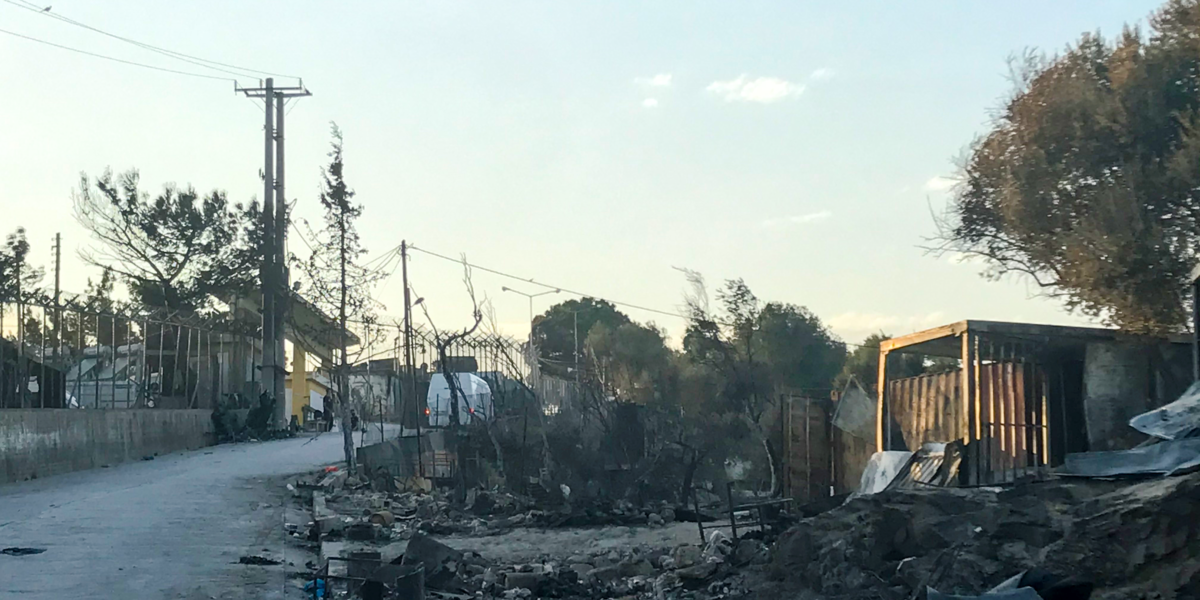As the coronavirus continues to infect our world, it’s important not to forget that before COVID-19, crises were already raging around the world. These ongoing crises are destroying the well-being of people and thrusting them into harm’s way. Not only are these crises still happening, but they have been exacerbated by the pandemic.
People around the world are fleeing war and economic strife. Some of them are moving in next door. Jesus calls us to love our neighbors, no matter where in the world they are. Following that call, Mennonite Mission Network is responding to ministries that assist those searching for better lives.

Migrants walk by the new camp, located on former military shooting grounds. Photo by Sophie Lapp Jost.
Mission Network personnel help refugees stranded by Lesbos fire
Recently, Mission Network personnel David and Sophie Lapp Jost were in Lesbos, Greece, with the German Mennonite Peace Committee, for an annual tour to learn about the economic, political and environmental crises that forced people to flee their homes. While there, a fire tore through Moria, a refugee camp housing more than 12,000 people.
The tour participants paid for emergency food and water for some of the refugees resting in the shade of some of the island’s 11 million olive trees.
"Our group has also met daily with a group of six young people and brought them food, medicine, and water, and has gotten legal advice for them," David Lapp Jost wrote.
He continued to say that neither Americans, Europeans, nor the refugees seem to understand that decades of aggressive American wars and infusions of arms in the Middle East and parts of Africa, across many presidential administrations, are significantly responsible for this situation.
Mission Network contributed directly to Lesbos Solidarity, upon recommendation from the German Mennonite Peace Committee, an organization that supports the Pikpa Camp. This camp is a safe and healthy space for the most vulnerable refugees: pregnant mothers and children, those who are ill, and those who live with disabilities. In addition to the Pikpa Camp, Lesbos Solidarity runs a project called Mosaik. It offers language classes, crafts, activities, and part-time work making high quality bags out of recycled materials.
"Please keep the people of Lesbos in your prayers," Sophie Lapp Jost wrote. "The situation is complicated by COVID-19, the Greek authorities, and local people who are unhappy with what life in the last decade has become on the island."

Alba Silva of Iglesia Menonita Quito prepares rice, beans, milk powder, sugar and toilet paper to share with refugee families facing food shortages due to the COVID-19 pandemic. Photo by Loren Hostetter
Quito congregation aids refugees
The congregation in Quito, Ecuador, has assisted refugees (most commonly from Colombia and Venezuela) since 2002. With assistance from partners, the Quito church’s refugee project has helped between 80 and 100 refugee families each month.
During the COVID-19 pandemic, there was a dire need to provide food for people, since many refugees survive day-to-day, working on the streets or in informal labor. Together, with volunteers from the church and generous donations through Mission Network, the project expanded to give food rations to more than 200 families each month.
Alexandra Meneses, co-coordinator of the church refugee project said, "We are a small community; however, God has allowed us to serve our brothers and sisters, accompanying them to find hope and be the visible and concrete presence of God in their lives."
Meneses reflected on the difficult circumstances and how the community has had to adapt to its new realities: "We have been challenged to face crisis situations that have sometimes threatened to sink our boat, and our Church in the midst of so many challenges and uncertainty," Meneses said. "We have seen the fidelity of God that has accompanied us on this pilgrimage."
Mission Network is supporting churches in the development of a holistic gospel that calls congregations to care for people who have been forced from their homes, as well as others in need. This kind of partnership is how Mission Network lives out its call to lead, mobilize and equip the church to participate in holistic witness to Jesus Christ in a broken world.








